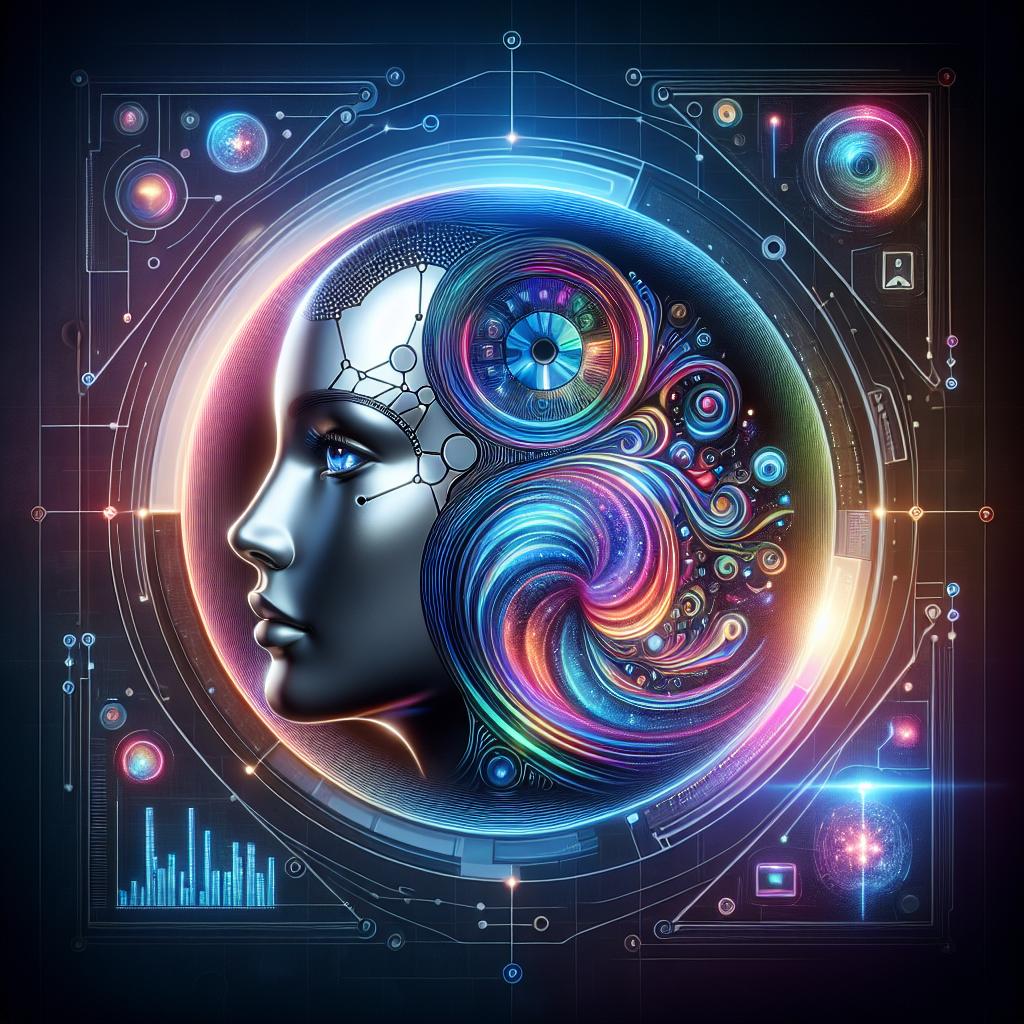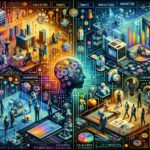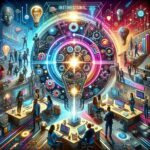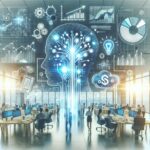TL;DR:
- Artificial Intelligence redefines societal ideals of perfect partners by analyzing deep compatibilities beyond superficial traits, challenging traditional notions.
- Startups must prioritize privacy and transparency when developing AI-powered relationship-enhancing technologies to build trust with users.
- AI can unintentionally reinforce stereotypes if trained on biased data sets, emphasizing the collective responsibility to ensure ethical practices in defining 'ideal' partners.
- Diversity in AI datasets ensures broader representation and inclusivity when defining an ideal partner, requiring ethical considerations and transparency around user data.
Ever wondered if AI can sketch out your dream partner? As we weave through the complex tapestry of relationships, the quest for the "ai ideal man and woman" often leads us down a rabbit hole of expectations. But what happens when artificial intelligence steps in to paint that picture? Our yearning for connection meets cutting-edge tech, challenging our deepest notions of the perfect match. In this cozy chat, we'll explore how AI shapes our views on love and partnership. We're diving into uncharted waters, where bytes meet heartbeats—unpacking biases, ethics, and inclusivity. Stick around; it's going to be a heartwarming ride!
The Influence of AI on Ideal Relationships
In the ever-evolving landscape of love and relationships, artificial intelligence (AI) is playing an increasingly significant role. From shaping our societal perceptions to altering the dynamics of modern romance, AI has become a silent partner in the quest for finding the "ai ideal man and woman." But what does this mean for startups that are at the forefront of this technological revolution?
Impact of AI on Societal Perceptions of an Ideal Partner
The concept of an ideal partner has long been a subject of contemplation and debate. In today's digital era, AI is offering new perspectives on what constitutes the perfect match. With advanced algorithms and data analysis, AI systems can predict compatibility between individuals with startling accuracy.
"Artificial intelligence is redefining the rules of attraction by uncovering patterns in human behavior that were previously unseen."
Startups leveraging AI are creating platforms that go beyond superficial traits, focusing instead on deep-seated compatibilities such as values, life goals, and personality types. By analyzing vast amounts of data from user interactions, these platforms offer tailored suggestions that challenge traditional notions of 'ideal' partners.
One might wonder how this technology influences individual expectations. As people get accustomed to curated matches based on sophisticated algorithms, there's a potential shift towards expecting perfection or a certain 'type,' which may not align with reality. This raises questions about whether we're being fair to ourselves and others in our pursuit of an AI perfect match.
Role of AI in Shaping Modern Relationship Dynamics
Modern relationships are complex, multifaceted constructs that have now begun to intertwine with technology. Startups using AI are not only helping individuals find love but also assisting them in maintaining it. From communication assistance bots that help couples navigate through tough conversations to predictive analytics for understanding relationship health – AI is transforming how we interact within our personal lives.
For instance, imagine a scenario where your smart device can sense tension during a conversation with your partner and suggests taking a break or offers ways to deescalate the situation. It's like having a relationship coach available 24/7.
Moreover, startups are tapping into this space by creating apps that provide personalized date night ideas or couple activities based on shared interests – all powered by AI business services. These innovations aim to enhance quality time spent together, thus fostering stronger bonds.
However, while there are benefits to this level of involvement from AI in our intimate relationships, it also brings up privacy concerns and ethical considerations around dependency on machines for emotional support and decision-making.
Navigating Privacy Concerns
As startups integrate more AI into their products aimed at enhancing romantic connections, they must address privacy concerns head-on. Users need assurance that their most personal data – from chat logs to behavioral patterns – is handled with utmost care.
To build trust with users considering their business ideas around AI ideal man and woman, companies must ensure transparency around data usage policies and invest heavily in securing sensitive information against breaches.
Ethical Considerations Around Emotional Dependency
While it's fascinating how much assistance we can receive from intelligent systems in managing our relationships effectively, there's an ongoing debate about becoming too reliant on technology for emotional needs. Are we inadvertently allowing machines to dictate the course of our most human experiences? This question lingers as developers innovate further within this domain.
In response to these concerns startups exploring innovative business plans should consider incorporating features that encourage autonomy and personal growth alongside those promoting partnership harmony.
Conclusion: The Future Is Intertwined With Technology
The intersection between technology and romance promises exciting developments for startups keen on harnessing AI's power. As societal norms evolve alongside advancements in artificial intelligence capabilities, so too will our understanding and expectations regarding ideal partnerships.
Take Away
- Artificial Intelligence reshapes societal ideals around perfect partners by providing insights into deeper compatibilities.
- Startups must prioritize privacy when developing relationship-enhancing technologies powered by artificial intelligence.
- While embracing tech-assisted romance holds promise; ethical considerations around emotional dependency warrant careful thought.
Ethical Considerations in AI's Definition of an Ideal Man and Woman
In the vibrant world of artificial intelligence, where AI ideal man and woman concepts are increasingly gaining traction, we're on the cusp of an ethical dilemma. As AI continues to permeate every facet of our lives, including how we define relationships and ideals, it's crucial to ask: How does technology shape our perceptions of the 'ideal partner'?
Biases and Stereotypes in AI's Representation of an Ideal Man and Woman
Imagine a scenario where an AI application is designed to suggest potential life partners based on user preferences. The danger lies not in the matchmaking but in the underlying algorithms that could perpetuate stereotypes. These systems often learn from vast datasets that include historical biases—leading to a skewed portrayal of what constitutes an "ideal" man or woman.
For instance, if the data fed into these systems comes from romantic comedies or literature that glorifies certain attributes over others, AI might start associating those characteristics with the concept of ideal partners. This could reinforce harmful stereotypes about gender roles or physical appearances—potentially leading individuals towards unrealistic expectations.
"As we delegate more of our decision-making to machines, we must scrutinize the data shaping their choices."
Ethical Implications of AI's Influence on Societal Ideals of Relationships
The question then becomes one of responsibility. Who should oversee ensuring that these AI and ideal relationships technologies are promoting healthy standards? It's not just about preventing discrimination; it's also about fostering diversity and inclusivity in AI-generated content.
When you consider AI’s impact on society’s view of relationships, there’s a real risk that such systems could narrow down our understanding rather than expand it. They might create echo chambers where only certain types of relationships are seen as desirable or 'normal.' This doesn’t just affect individual choices but can have broader societal implications by influencing cultural norms around partnerships.
We need to be proactive about these issues because they’re not just hypothetical scenarios—they’re happening now. For example, dating apps using algorithmic matching may already be influencing users’ perceptions without them even realizing it.
The Responsibility Lies With Us All
It falls upon developers, ethicists, policymakers, and users alike to engage in this conversation actively. We must develop frameworks for potential ethical implications so that as we innovate with ideas like ai ideal man and woman concepts, we do so responsibly. This includes transparent algorithms, diverse data sets free from historical biases, ongoing monitoring for unintended consequences, and open dialogues about what ethical AI means when applied to deeply personal aspects such as companionship.
Take Away
- AI can unintentionally reinforce stereotypes if trained on biased data sets when defining 'ideal' partners.
- There is a collective responsibility to ensure ethical practices in AI influence on relationship ideals.
- Transparent algorithms and diverse data are key in avoiding narrow societal views shaped by artificial intelligence.
Promoting Inclusivity in AI's Concept of an Ideal Partner
In the swiftly evolving landscape of artificial intelligence (AI), our understanding of human relationships is being reimagined. AI and dating have become intertwined, challenging traditional notions of compatibility and partnership. The concept of an 'ai ideal man and woman' no longer fits within the rigid stereotypes of yesteryear; instead, it calls for a new, inclusive approach that reflects the diverse fabric of society.
Leveraging Diverse Datasets to Redefine the Ideal Man and Woman in AI
When we talk about AI in terms of finding an ideal partner, it's essential to recognize that what constitutes "ideal" varies immensely across cultures, personalities, and individual preferences. The era where one-size-fits-all standards dictated desirability is fading away. Today's AI systems must be built on diverse datasets that encapsulate the full spectrum of human diversity.
For instance, AI game idea generators often use extensive datasets to create varied gaming experiences. Similarly, when developing AI for relationship-matching or virtual companionship apps, it’s crucial to input a wide range of characteristics and preferences to ensure that users can find genuinely compatible matches—not just those who fit a narrow stereotype.
"Diversity is not about how we differ. Diversity is about embracing one another's uniqueness."
By leveraging expansive datasets from different demographics and psychographics, AI can transcend traditional biases to define 'ideal' more inclusively. This isn't just about being politically correct; it’s about creating technology that serves everyone effectively. For startups looking into AI business services, this inclusive approach can be a significant differentiator in the market.
Ensuring Ethical Considerations for Inclusive Representations in AI Algorithms
Ethics play a pivotal role when programming AI algorithms—especially those dealing with human emotions and relationships. As we integrate artificial intelligence into the domain of dating and companionship, ethical considerations must guide us toward inclusive representations.
A common pitfall is algorithmic bias—wherein an AI system inadvertently perpetuates stereotypes due to skewed training data or developer oversight. To combat this, startups should embrace ethical frameworks from their inception stages, as seen with companies featured on validating startup idea readiness platforms.
Creating an ethical guideline involves rigorous testing across various user groups to identify any biases or shortcomings within the system. Moreover, transparency with users regarding how their data is used can build trust—a critical factor for any service dealing with personal aspects like relationships.
The integration of ethics also extends to privacy concerns around sensitive data related to personal preferences in partners. Startups venturing into this space need robust security measures akin to those described in articles on ensuring business safety through risk analysis and mitigation.
Take Away
- Diversity in AI datasets ensures broader representation and inclusivity when defining an ideal partner.
- Ethical considerations are paramount for startups integrating AI into human relationship domains.
- Transparency and security around user data enhance trustworthiness in AI-driven relationship services.
Conclusion
Frequently Asked Questions
What is the concept of an ideal man and woman in AI?
In the context of AI, the concept of an ideal man and woman refers to the ethical considerations and biases that may be embedded in AI algorithms when it comes to gender representation.
How does AI influence the perception of an ideal man and woman?
AI can influence the perception of an ideal man and woman through the data it is trained on, potentially reinforcing societal stereotypes and biases.
What are the potential ethical implications of AI defining an ideal man and woman?
The potential ethical implications include perpetuating gender stereotypes, reinforcing inequality, and influencing decision-making processes based on biased representations.
Can AI contribute to a more inclusive definition of an ideal man and woman?
AI has the potential to contribute to a more inclusive definition by being programmed with diverse and representative datasets, as well as through ethical considerations in algorithm development.
How can we address biases in AI's representation of an ideal man and woman?
Addressing biases in AI's representation involves promoting diversity in dataset collection, implementing bias detection algorithms, and fostering interdisciplinary collaboration to ensure ethical considerations are prioritized.





Leave a Reply